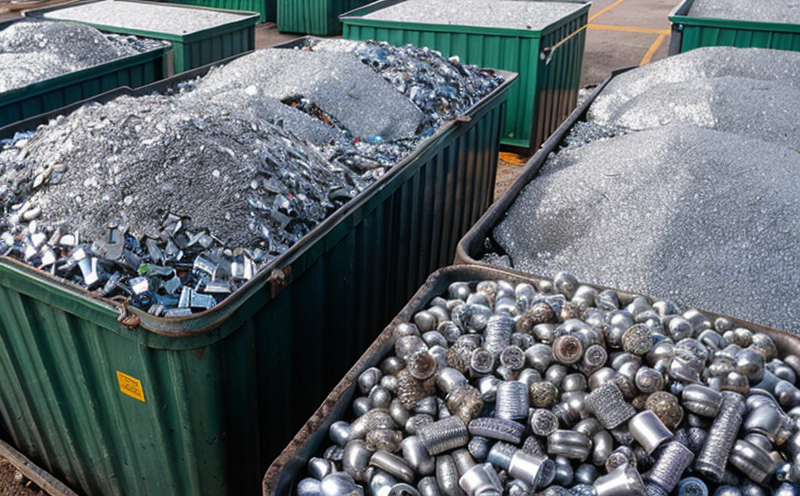ASTM E132 Hafnium in Recycled Metals
The ASTM E132 standard provides a comprehensive framework for quantifying hafnium content in recycled metals. This method is critical for ensuring the integrity and purity of metal alloys, particularly in sectors like aerospace, nuclear engineering, and high-strength steel production where even trace amounts of impurities can significantly impact performance.
Recycling metals helps reduce environmental impact by minimizing waste and conserving natural resources. However, the presence of hafnium, a refractory metal with unique properties, can be problematic if not properly managed. ASTM E132 addresses this issue by specifying precise techniques for its detection and quantification.
Our laboratory adheres strictly to the protocol outlined in ASTM E132, ensuring accurate and reliable results that are essential for compliance with industry standards. This testing is particularly crucial when dealing with recycled metals from diverse sources, as they may contain varying levels of hafnium depending on their original composition.
The test process involves several key steps: sampling, sample preparation, analysis using inductively coupled plasma mass spectrometry (ICP-MS), and finally, reporting the results. Sampling is critical to ensure a representative sample that reflects the metal's overall composition. Once collected, samples undergo rigorous preparation, including cleaning and digestion if necessary.
The ICP-MS technique allows for highly sensitive and precise measurement of hafnium content, making it ideal for this application. This method ensures accurate quantification down to trace levels, which is essential given the minute amounts typically found in recycled materials. The resulting data provides valuable insights into the metal's purity and suitability for specific applications.
Compliance with ASTM E132 not only enhances product quality but also supports broader sustainability goals by ensuring that recycled metals meet stringent standards. This commitment to accuracy and precision is crucial, especially when hafnium can influence critical performance characteristics in high-stakes industries.
In summary, our service ensures that recycled metals comply with ASTM E132 requirements, providing reliable data on hafnium content. By doing so, we support the responsible use of recycled materials and contribute to sustainable practices across various sectors.
Environmental and Sustainability Contributions
- Minimizing Waste: Our testing helps identify metals that can be effectively recycled, reducing landfill waste.
- Conserving Resources: By ensuring the purity of recycled materials, we help conserve natural resources used in primary metal production.
The accurate quantification of hafnium content is vital for maintaining the quality and safety of recycled metals. This testing supports a circular economy by enabling the reuse of valuable materials without compromising on performance or environmental impact.
By aligning with ASTM E132, we contribute to reducing the carbon footprint associated with metal production. The recycling process itself has a lower energy requirement compared to primary metal smelting, and accurate testing ensures that recycled metals are used in applications where they perform optimally without introducing unwanted elements like hafnium.
Our service plays a pivotal role in promoting sustainable practices by ensuring that recycled materials meet stringent quality standards. This not only supports the circular economy but also fosters responsible sourcing and use of resources, aligning with global sustainability goals.
Competitive Advantage and Market Impact
- Innovation in Recycling: Our testing enhances product quality by ensuring that recycled metals meet the highest purity standards, thus fostering innovation in recycling processes.
- Market Differentiation: Compliance with ASTM E132 sets a benchmark for metal purity, helping manufacturers differentiate their products in competitive markets.
The ability to accurately quantify hafnium content is not only critical for compliance but also a differentiator in the market. Industries that rely heavily on high-purity metals can use our testing results to ensure product reliability and safety. This capability positions them favorably against competitors who may lack such stringent quality controls.
Our service supports manufacturers in meeting increasingly stringent environmental regulations, thereby enhancing their reputation for sustainability. By ensuring compliance with ASTM E132, we help them comply with global standards, which is essential given the international nature of many metal markets.
The accurate quantification of hafnium content also reduces the risk of introducing unwanted elements into products, which can have significant implications for performance and safety. This reliability fosters trust among customers and partners, further enhancing competitive advantage.
By leveraging ASTM E132, our clients can ensure that their recycled metal products meet or exceed industry standards, thus gaining a competitive edge in the market. This commitment to quality supports long-term relationships with suppliers and customers, ultimately driving business growth and sustainability.
Use Cases and Application Examples
The ASTM E132 test is particularly relevant in industries where metal purity is critical for performance and safety. Here are some specific use cases:
- Aerospace Industry: Ensuring that recycled metals used in aircraft components meet the stringent quality standards required by NASA.
- Nuclear Engineering: Verifying the purity of recycled metal alloys used in nuclear reactors to prevent contamination and ensure safety.
- Hight-Strength Steel Production: Guaranteeing that recycled steel meets the high-strength requirements for construction projects like skyscrapers or bridges.
In each case, accurate quantification of hafnium content is essential. In aerospace applications, even trace amounts of hafnium can affect material properties and performance. Similarly, in nuclear engineering, purity ensures safe operation without the risk of contamination, while in high-strength steel production, precise control over alloy composition is crucial for ensuring structural integrity.
Our testing service supports these industries by providing reliable data that helps them maintain compliance with industry standards and ensure product quality. This commitment to accuracy and precision is vital given the critical nature of the metals used in these applications.





